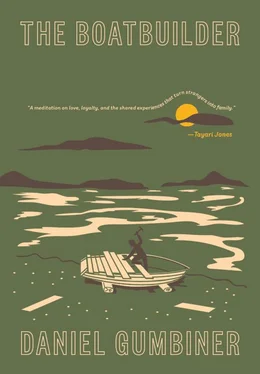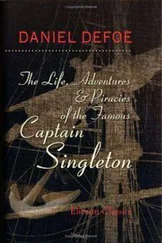“I heard JC’s heading down there to spring them,” Simon said.
“Who told you that?” Berg said.
“That new girl at the bakery.”
“Simon, stop it with your conspiracies,” Garrett said. “Berg would tell us if that was the case. Wouldn’t you, Berg?”
“I guess,” Berg said.
“Why would JC risk his neck to go spring those guys, Simon?” Garrett said.
“So they don’t rat on him,” Simon said.
“Pat won’t rat, Simon. He won’t. I know that dude. He’s a tough Texas hombre.”
“All I know is it took Deputy White two minutes to get Cal to rat on Lee Kearns last year.”
“For the thing with the tractor?”
“That’s right,” Simon said. “The police have sophisticated techniques. That’s all I’m saying.”
“Simon, what I’m saying is you have no idea what you’re talking about.”
Berg didn’t tell Garrett and Simon anything, but he did know some things. He knew Pat had been caught while stopping to reprovision the ship in San Diego. He knew that the police had confiscated nearly eleven thousand pounds of pot and that Pat and his crew were facing ten-year sentences. He knew that Lammy had been interrogated in Sacramento and he knew that JC had made it down to Mexico without incident. According to Lammy, he was hiding out in Michoacán somewhere. It was not clear if and when he would be able to return.
Those few weeks after the arrest were dark ones, but they also seemed to bring everyone closer. Berg helped out with the farm and he got to know Rebecca better. He also became closer with Alejandro’s son, Sandy, who took Berg fishing in his little dory. He was fifteen years old, a strange young man who read ancient Eastern epics and tried, unsuccessfully, to hunt with a bow and arrow that he’d built himself. Berg liked him: he was open-minded and smart and unpredictable. Once, while they were out on the water, he told Berg that he considered him a member of the family. Berg was surprised by how good it made him feel.
By the end of the month, Alejandro seemed to be in a better mood. He started making trips to town again and seemed less fearful of interacting with people. He and Berg started construction on a wine cellar near Lizzie and Jens’s cabin, and as they worked, Alejandro began to explain his plans for the future of the shop, which clearly he’d been ruminating on for the last month. Without the revenue from JC, they’d need to make a pivot, he said, but there were lots of opportunities for them. His favorite idea had to do with the production of canoes. Years ago, he had designed an affordable two-plank canoe. It was a simple design and he planned to construct it entirely out of coastal fir, which grew in abundance around the farm.
“We could use a spongier wood for the spline,” he said. “Maybe we use cedar or something to prevent the spline from breaking, but other than that it’s just fir.”
Alejandro called it the twenty-four-hour canoe because he could build one, alone, in twenty-four hours. Apparently he had timed himself doing this several years ago. He insisted that Berg and Uffa could also produce one of these boats in twenty-four hours, though Berg doubted this. The main idea was to build out these canoes and rent them to tourists on the bay. There were a few kayak and canoe rental places operating, but none of them used wooden boats. Alejandro thought people would see these boats on the water and prefer them. Over time, they’d build up a small fleet of rental canoes, which would provide a steady base-level income for the shop, and then, on occasion, they could sell them off for a thousand dollars if anyone inquired about purchasing one.
“We’ll mill the fir ourselves,” he said. “We’ll build one boat per day. We can even build them out on the beach, right behind the house, so people going by on the ferry will see them. It will be free advertising.”
Another part of his plan was the construction of a 3-D ocean-farming system, which he had read about online. The goal, he explained, was to produce a vertical sea garden, anchored by oyster traps. The ropes of the traps would grow seaweed and mussels and there would be clams beneath the oyster traps. It was very environmentally sustainable, he explained, because it required no feed, no water, and no fertilizer. They could harvest sea salt, too, and dry it in the greenhouse. Berg asked Alejandro where he’d read about all of this.
“Forums,” he said, without elaborating.
The third prong of Alejandro’s scheme was a weekend boatbuilding class. The class would consist of about nine students, and they would meet on Saturday, all day, and learn the basics of wooden boat construction. Most of them would never learn anything more complex than mortise and tenon but that was okay. Apparently, Alejandro had taught a class like this back in the ’80s and it had been popular. Morty Weisenstein, the local DJ, had been his first student. This was back when the Morrises had convinced Morty that he was a Venutian.
“That was a strange time for him, spiritually speaking,” Alejandro said. “He did great in the class, though. Made a nice hollowing plane.”
Before any of these operations got underway, however, they were distracted by different projects. The first one came in the form of John Coleman, knocking at the door of the farmhouse during dinner, begging for help. Coleman said his boat had begun to take on water and he didn’t know why. He was worried. He needed someone to fix it but he had no money.
“And why would I help you?” Alejandro asked.
“Well, I’ve asked all the other boatbuilders and you’re the only one left.”
“How would you eventually be able to pay me?”
“I’d be able to pay you because I’d be able to fish again.”
Berg didn’t know Coleman, but he knew the stories about him. Back when Berg was a nightly drinker at the Tavern, he’d listened to more than one man complain about the debt John Coleman owed him. But Alejandro decided to give Coleman the benefit of the doubt and, the following morning, he asked Berg to come with him to Vlasic’s Boat Works.
“What are we doing?”
“We’re fixing John Coleman’s boat,” Alejandro said.
Vlasic was not around that morning when they arrived. Technically they should have waited for him to return before hauling out, but Alejandro was impatient and did it anyway. After briefly inspecting the boat, he noticed that the garboard plank seemed poorly fastened. He took it with one hand and ripped the whole thing off.
“There’s the problem,” he said.
The two of them worked throughout the morning but there was still no sign of Vlasic. During lunch, Coleman invited Berg into the galley of his boat to eat. Alejandro had driven home to eat lunch with Rebecca and to check on one of the cows, who he said had something funny going on with her knee. In the galley, Coleman opened his refrigerator and asked Berg if he wanted a hamburger. Berg could tell by the smell emanating from the refrigerator that Coleman’s hamburger meat was rancid, and he told him so.
“This meat?” Coleman said, taking a handful of the raw chuck in his hand and holding it up for Berg to inspect.
“Yes.”
Coleman shrugged and put the raw meat in his mouth, chewed, and swallowed. “No, it’s fine,” he said.
“I think I’m going to go get a sandwich from Gary’s next door.”
“Suit yourself.”
When Berg returned from Gary’s Oysters, he found Vlasic screaming at Coleman. Daryl Shapton and Jim Moltisanti were standing by, having recently hauled out the catboat they co-owned.
“What are you doing, Coleman?” Vlasic yelled. “The boat has to go back in the water. It’s blocking one of my main railways!”
“The plank was ripped off,” Coleman said. “It will sink.”
Читать дальше












